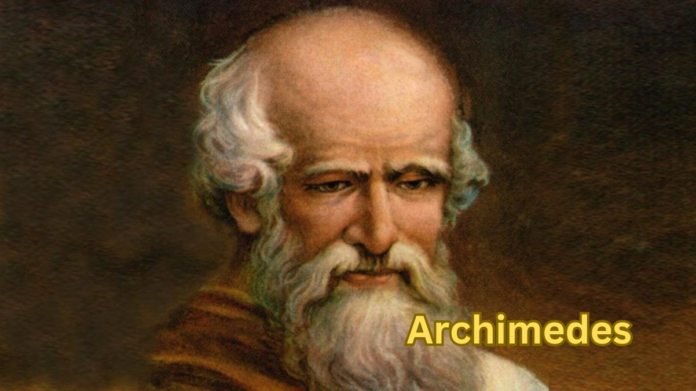In the annals of human history, few names shine as brightly as that of Archimedes of Syracuse, a Greek mathematician, physicist, and inventor who lived during the golden age of ancient Greece. Born around 287 BC in the thriving city-state of Syracuse on the island of Sicily, Archimedes would become one of the greatest minds of antiquity. His pioneering work in mathematics, physics, and engineering left an indelible mark on the scientific world and laid the groundwork for many of the technological marvels that we take for granted today. This biography chronicles the life and remarkable achievements of Archimedes, a true intellectual giant of the ancient world.
Page Contents
Early Life and Education of Archimedes
Archimedes was born into an aristocratic family in Syracuse, a city known for its vibrant culture and intellectual pursuits. From a young age, his inquisitive mind displayed an insatiable curiosity about the natural world. He received a comprehensive education, which included a strong foundation in mathematics, the sciences, and philosophy.
It is believed that Archimedes studied under the renowned mathematician and astronomer Conon of Samos. Under Conon’s guidance, he immersed himself in the study of geometry, algebra, and mechanics. These formative years would lay the foundation for Archimedes’ future contributions to mathematics and science.
The Eureka Moment: Buoyancy and the Bath
One of the most legendary stories associated with Archimedes is the tale of his “Eureka moment.” According to ancient accounts, Archimedes was asked by King Hiero II of Syracuse to determine whether a gold crown, supposedly made entirely of pure gold, was indeed genuine. The challenge was to determine the crown’s purity without damaging it.
The story goes that as Archimedes pondered this problem, he decided to take a bath. As he submerged himself into the water, he noticed that the water level in the bathtub rose. This observation sparked a moment of insight. Archimedes realized that the displacement of water could be used to determine the volume of irregularly shaped objects, such as the crown. He famously exclaimed “Eureka!” (Greek for “I have found it!”) and rushed naked through the streets of Syracuse to share his discovery.

This principle, now known as Archimedes’ principle, explains the buoyant force experienced by objects submerged in a fluid. It marked a significant breakthrough in understanding the physics of floating objects and laid the groundwork for Archimedes’ further investigations into geometry and mathematics.
Archimedes’ Achievements in Mathematics
Archimedes’ contributions to mathematics are nothing short of extraordinary. He made significant advancements in a wide range of mathematical disciplines, fundamentally changing the landscape of the field.
Geometry:
Archimedes made groundbreaking discoveries in geometry. He is best known for his work on measuring the volume and surface area of three-dimensional objects. He developed the method of exhaustion, a precursor to integral calculus, to calculate the area of irregular shapes. This technique was instrumental in calculating the volume of spheres and cylinders, leading to his famous formula for the volume of a sphere: V = (4/3)πr³.
Pi (π):
Archimedes made significant strides in approximating the value of pi (π), the mathematical constant representing the ratio of a circle’s circumference to its diameter. He was the first to rigorously estimate pi, using a method known as the “circumscribed and inscribed polygons.” His calculations were remarkably accurate for his time and laid the foundation for future mathematicians to refine the value of pi.
Integral Calculus:
Archimedes’ method of exhaustion, mentioned earlier, was a precursor to integral calculus, a branch of mathematics developed more fully by later scholars like Isaac Newton and Gottfried Wilhelm Leibniz. This method allowed him to calculate the area under curves, a fundamental concept in calculus.
Inventions and Engineering Feats
Archimedes was not limited to the world of abstract mathematics; he was also an accomplished inventor and engineer. He applied his mathematical knowledge to solve practical problems and create innovative devices.
The Archimedes Screw:
One of his most famous inventions, the Archimedes screw, was a device designed to raise water from a lower level to a higher one. It consists of a helical screw enclosed in a tube. When the screw is rotated, it scoops water from a lower source and transports it to a higher point. This ingenious invention had practical applications in irrigation and is still used today in some parts of the world.
Defensive Machines:
During the Second Punic War between Rome and Carthage, Archimedes was tasked with designing defensive machines to protect the city of Syracuse. His inventions, including giant claw-like cranes and mirrors that reflected sunlight to set enemy ships on fire, demonstrated his engineering prowess and temporarily thwarted the Roman siege.
Legacy and Influence
Archimedes’ legacy extends far beyond the confines of his lifetime. His work in mathematics, physics, and engineering laid the foundation for countless discoveries and innovations in the centuries that followed.
Throughout the Middle Ages and the Renaissance, Archimedes’ writings were preserved and studied by scholars, contributing to the revival of interest in ancient Greek science and mathematics. His works would inspire thinkers like Galileo Galilei and Johannes Kepler during the Scientific Revolution.
In the modern era, Archimedes‘ contributions to mathematics continue to be celebrated. His principle of buoyancy remains a fundamental concept in fluid mechanics, and his approximations of pi serve as a testament to the enduring relevance of his work.
Conclusion
Archimedes of Syracuse, the brilliant polymath of antiquity, left an indelible mark on the fields of mathematics, physics, and engineering. His insatiable curiosity and groundbreaking discoveries continue to inspire scientists and mathematicians to this day. Archimedes’ life and work serve as a testament to the enduring power of human intellect and the unquenchable thirst for knowledge that transcends the boundaries of time and place. His name will forever be synonymous with genius and innovation.


